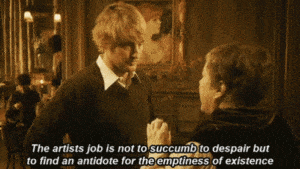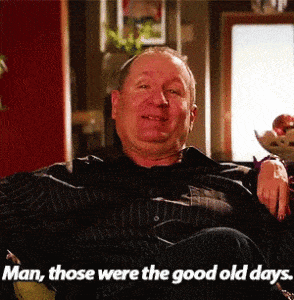If you haven’t seen the movie Midnight in Paris, I’d definitely recommend giving it a watch. It’s a sweet, fun, and thought-provoking movie. Owen Wilson plays the main character and his natural charm and charisma make it such an enjoyable viewing experience.

The film follows Gil Pender, a Hollywood screenwriter and aspiring novelist who travels to Paris with his fiancee and future in-laws. While Gil hopes Paris will provide him with the inspiration he needs to finish the book he’s been struggling to finish, the vacation actually ends up shedding some light on some of the shortcomings of his relationship with his fiancee.
At the onset of the movie, you find out that Gil feels like he was born too late. He romanticizes the idea of being alive during the cultural revolution in 1920s Paris with other writers like Hemingway and Fitzgerald. If only he could go back to that time, all of the problems he has now would disappear and he would be much happier. Life was easier and more simple back then.
On a day trip to Versailles, Gil’s know-it-all friend tries to call him out on his nostalgia for the past:
Nostalgia is Denial | Midnight in Paris (2011)
“Nostalgia is denial—denial of the painful present. And the name for this fallacy is called golden age thinking—the erroneous notion that a different time period is better than the one one’s living in. It’s a flaw in the romantic imagination of those people who find it difficult to cope with the present.”
Even though the know-it-all friend is a character you grow to despise over the course of the movie, I do think he has a point here.
With social media and the 24/7 news cycle that we have today, it’s easy to be discouraged about what’s happening in the world and be fearful of the future. Negativity can be found everywhere we look. Throw a rock, hit a problem.
I mean, every time I log on to Twitter every other tweet is telling me that we’re all going to be replaced by A.I. and no one will have a job two years from now.
So instead of dealing with the unpleasant issues we face today, it can be tempting to look back at previous generations and yearn for a simpler past.

However, as I wrote about a while back, there are droves of statistics and data to show that the world is objectively getting better with each passing decade. And there’s never been a time period without problems. As Franklin Pierce Adams said:
“Nothing is more responsible for the good old days than a bad memory.”
Aside from this being a good reminder to live in the present and to realize the amazing benefits of being alive when we are, I think this nostalgia for the past and uneasiness about the present and future can creep into our financial decisions.
The very act of investing is an act of optimism about the future. Good investing comes down to surviving the inevitable short-term setbacks and disappointments (the declines, the recessions, panics, and wars) in order to enjoy long-term progress and compounding.
The recession of 2008 can be used as an example. The economy and the stock market were in flux. The housing market was tanking. People were losing their jobs. There was very little good news to be found. It was an extremely difficult time for many people. The outlook on the future must have been grim.
However, looking back now with the benefit of hindsight, it was an incredible buying opportunity for investors. Since the U.S. stock market bottomed in early 2009, it steadily rose over 500% in the subsequent decade.
Morgan Housel has said:
“All past declines look like opportunities and all future declines look like risks.
It’s one of the great ironies in investing. But it happens for a reason: When studying history you know how the story ends, and it’s impossible to un-remember what you know today when thinking about the past. So it’s hard to imagine alternative outcomes when looking backward, but when looking ahead you know there are a thousand different paths we could end up on.”
The past is appealing to us because we know how things turned out and that certainty is comforting. We get anxious about the future because of the unknown.
Although, given a long enough time horizon and a diversified portfolio, the stock market has historically been very predictable. At almost any point over the past 100 years, you could have looked back in time 15 years and wished you had started investing then.
In 2038, when having a conversation with your friends about investing, someone is almost bound to say, “Man, can you believe where you could have bought stocks in 2023?”

Being a fairly nostalgic person myself, I think there’s room for nostalgia about certain aspects of the past while still realizing the great opportunities available to us today.
At some point in the future, we’ll likely look back at today with the same fondness we regard the past with now.
As Andy from The Office puts it:
“I spent so much of my time here at Dunder Mifflin thinking about my old pals. The weird thing is, now I’m exactly where I want to be, I got my dream job at Cornell and… I’m still just thinking about my old pals. Only now they’re the ones I made here.
I wish there was a way to know you’re in the good old days before you’ve actually left them.”
Thanks for reading!

